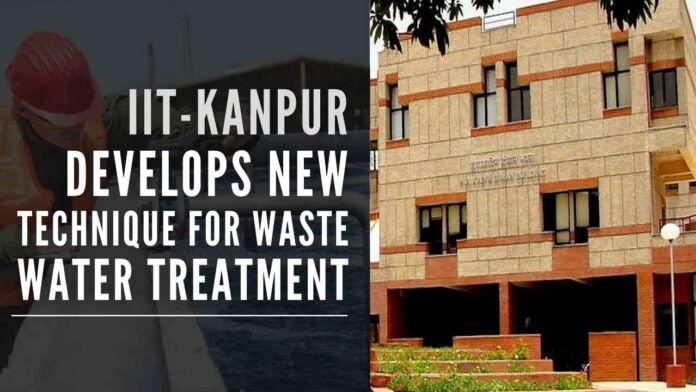
A new technique for waste water treatment developed by IIT Kanpur researchers
In a significant development, a team from the Mechanical Engineering department of the
Indian Institute of Technology Kanpur (IIT Kanpur) has invented a novel nano-adsorbent for waste water treatment. The research was conducted by Dr. Archana Raichur and Dr. Niraj Sinha. The nano adsorbents developed at IIT-Kanpur have unique physio-chemical properties that can deactivate and separate the anti-biotic resistant bacteria (ARBs) from water.
The nano-adsorbent would help in the selective removal of antibiotic-resistant and metal-resistant bacteria from polluted water with a rapid method to synthesize. The uniform cubical nano-adsorbent is eco-friendly, reusable, bactericidal, and multi-layered and will help in the selective removal of harmful bacteria from water.
Nano-particles are being used greatly to curb water pollution by new emerging pollutants. The nano-particles act as adsorbents to remove the pollutants from water.
This is a major breakthrough regarding the current methodologies used to synthesize nano-adsorbents that have been researched in recent years for waste water treatment to address water pollution and related health concerns.
Professor Abhay Karandikar, Director IIT-K, said: “The world is reeling under several environmental hazards and water pollution is one of them. It bears direct implications for the health of humans and animals. At IIT-Kanpur, our research in the field of nanotechnology is broad and diverse and this invention bears testimony to that. This crucial invention in the form of these novel nano-adsorbents would not only curb water pollution but would also be crucially beneficial for humankind.”
Raichur said that in current times, water contamination due to drug and pharmaceuticals residues is on the rise. Along with growing water pollution, Antimicrobial Resistance (AMR) is a major public health issue that threatens the effective treatment of bacterial infections. Antibiotic-resistant bacteria are contagious in community and hospital settings.
Sinha said that the innovation has application in waste water treatment which improves water filtration and removes pathogens and bacteria selectively from drinking water. It can be used as a tool against microorganisms without any side effects and is compatible with the human body.
He added, These nano-adsorbents have potential in near future to be used as a component of membrane filters and tested for clinical evaluation and application on bio-remediation which is ready to be commercialized.
[With Inputs from IANS]
PGurus is now on Telegram. Click here to join our channel and stay updated with all the latest news and views
For all the latest updates, download PGurus App.
- Karnataka HM apologizes to Neha’s parents while the killer Fayaz’s mother expresses her desire to ‘punish her son’ - April 20, 2024
- US: Indian student’s death possibly linked to Blue Whale suicide game - April 20, 2024
- BSF seizes China-made drone near India-Pakistan border in Amritsar - April 20, 2024










